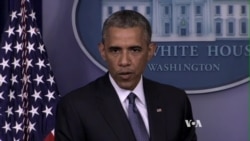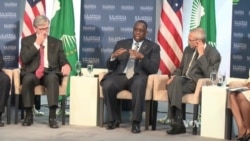The administration of President Barack Obama is working to strengthen ties with Africa at a three-day summit in Washington for some 50 African heads of state.
Monday's opening forums touched on a range of issues including security, health, the environment and corruption.
At one panel focused on trade, South African President Jacob Zuma urged the United States to renew the trade agreement, African Growth and Opportunity Act, when it expires next year.
Somali President Hassan Sheikh Mohamud focused on security issues, saying extremists threaten to hamper progress in eastern Africa, while Ethiopian Prime Minister Hailemariam Desalegn touched on climate change.
China, Europe and Japan have all held similar events to encourage investment in Africa, but the White House denies its Africa Summit is in response to increasing investment in Africa from China.
U.S. businesses have generally been hesitant to invest in Africa despite the high growth rates seen in many countries.
WATCH: Related video from VOA's Mariama Diallo
Billions of dollars in new funding is expected to be announced for Power Africa during the summit. The program’s goal is to add 10,000 megawatts of generation capacity and 20 million new electric customers in Africa by 2018.
Private industry has committed $7 billion to the program since it was announced last year by President Obama.
U.S. officials say only four African leaders were excluded from the talks — the presidents of Zimbabwe, Sudan, Eritrea and the Central African Republic.
On streets outside the State Department, demonstrators protesting U.S. engagement with leaders of Ethiopia and the Democratic Republic of Congo were a reminder of the risks of attracting investment to countries ruled by corrupt and repressive governments.
President Obama is scheduled address a U.S.-Africa Business Forum on Tuesday and take part in sessions Wednesday focused on economic growth, regional security, and good governance.
The United States is set to unveil nearly $1 billion in business deals, more funding for peacekeeping, and billions of dollars for food and power programs during the summit.
Top US officials weigh in
At one Monday panel on African civil society, U.S. Secretary of State John Kerry urged participants to push for democracy and individual rights in their countries.
At an earlier gathering on economic opportunity, Kerry outlined some of the U.S. goals
"It's also why were determined to deepen our partnership and deliver on remarkable opportunities for peace, for security, for economic growth, and perhaps for most important in the context of what brings us here today, the empowerment of people through their government, through their civil society," he said.
U.S. Vice President Joe Biden also addressed summit participants, saying the African continent has some of the world's fastest growing economies, and that those countries will help shape future developments in the world.
"We're on the cusp where the continent of Africa establishes itself as among the ranks of the world's most prosperous economic and free nations," he said. "In your hands, with your help, Africa can and will go so much further. You're the fastest growing economies in the world, and quite frankly the success of the rest of the world depends in part on your success."
Ebola outbreak
This week's summit coincides with an Ebola outbreak in several West African nations. President Obama said last Friday the United States is closely following the situation. He had said African officials from at-risk countries would be screened for the disease before entering the U.S.
The leaders of Sierra Leone and Liberia canceled their summit trips to Washington because of the outbreak.
Some information for this report comes from AP and Reuters. VOA White House correspendent Luis Ramirez contributed to this report.








